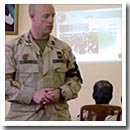Teaching War
Alex Cohen
Karen Fritsche
JANUARY 13, 2007
Listen to this Story

- West Point
- (West Point)
- View the Slideshow
Web Resources
More From Alex Cohen
- Workplace keeping its employees well
- Some company perks are worth keeping
- Homebuyers get a better price in spring
More From Karen Fritsche
This week President Bush laid out his new strategy for Iraq. And for the first time he also acknowledged that mistakes have been made. We'll go to West Point, one of the country's leading military colleges, to find out how the Iraq war figures into the coursework. Then we'll talk with Lieutenant Colonel Ike Wilson, who teaches policy and strategy courses at the college.
SS490A: Studies in Grand Strategy: Lessons for U.S. Policy
The United States Military Academy
Department of Social Sciences
West Point, New York
Spring 2007
MAJ Bradley L. Bowman
104 Lincoln Hall
A grand strategy is a nation's comprehensive plan of action that coordinates and directs all political, economic, and military means and their associated factors in order to attain large ends.
The purpose of this course is to examine the theory and practice of grand strategy throughout history in order to identify lessons and transferable principles applicable to the formulation of future U.S. policy. The strategies studied in the course span more than two and a half millennia, beginning with the strategies of Sun Tzu and culminating in recent commentaries on U.S. grand strategy. The course provides an opportunity to examine both practice and theory through the study of the grand strategies of history's great empires and nation-states, as well as the leading theoretical writing on grand strategy.
Why study grand strategy?
The famous Prussian theorist and military officer Carl von Clausewitz wrote, "If we keep in mind that war springs from some political purpose, it is natural that the prime cause of its existence will remain the supreme consideration in conducting it.
"The political object is the goal, war is the means of reaching it, and means can never be considered in isolation from their purpose." In other words, Army officers cannot afford the luxury of exclusively focusing on tactical competence. The American people and their elected representatives utilize military operations to achieve larger political ends. If the graduates of West Point are to effectively serve the American people as Army officers, they must understand the larger political context in which wars are fought. War is a means to an end, and an Army officer who does not understand the war's purpose may ultimately undermine it.
Army officers have an obligation to plan and conduct military operations in a manner that will support the U.S. grand strategy and ultimately achieve the larger political objective. Immersing cadets in the preeminent grand strategic thinking as well as the successes and failures of past grand strategies will help them fulfill this obligation. Not only will this course teach future Army officers to identify and understand the political, economic, diplomatic, demographic, cultural, and psychological factors that impact war and the state's welfare, but it will prepare future Army officers to better connect desired ends with available means in their day-to-day responsibilities.
-
- Music Bridge:
- Lasst Nicht Nach
- Artist: Couch
- CD: Figur 5 (Morr)







Comments
Comment | Refresh
Post a Comment: Please be civil, brief and relevant.
Email addresses are never displayed, but they are required to confirm your comments. All comments are moderated. Weekend America reserves the right to edit any comments on this site and to read them on the air if they are extra-interesting. Please read the Comment Guidelines before posting.
You must be 13 or over to submit information to American Public Media. The information entered into this form will not be used to send unsolicited email and will not be sold to a third party. For more information see Terms and Conditions and Privacy Policy.